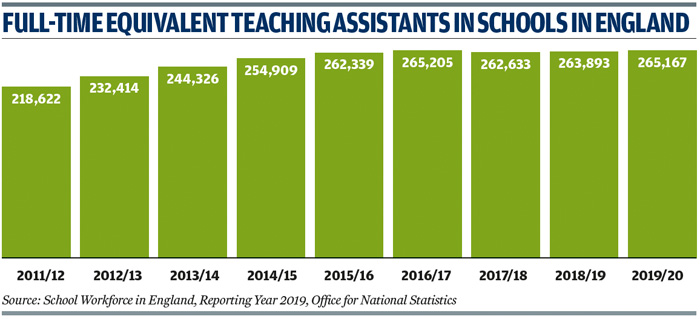
Head teachers say cuts to school funding mean they are being forced to reduce numbers of support staff. An Ofsted report published in February 2020 found most of the schools surveyed had reduced teaching assistant (TA) numbers. Government figures show the number of full-time equivalent teaching assistants in total rose by more than 1,000 to 265,167 in 2019/20, but this growth is almost entirely confined to special schools.
TAs make up 27.9 per cent of the school workforce and are graded from 1 to 4. The role of higher level teaching assistant was introduced for those who wanted to progress in their career. No specific qualifications are required to become a first level TA, but higher level TAs should hold a nationally recognised qualification at Level 2 or above in English and maths and must meet a set of 33 standards. A Level 3 Teaching Assistant Apprenticeship Standard is available. Cache offers a suite of qualifications from Level 1 to Level 4 in supporting teaching and learning, while City & Guilds offers a suite of Level 2 and 3 qualifications.
Maximising the Impact of Teaching Assistants is a programme of school workforce improvement and training delivered by the University College London Centre of Inclusive Education at the Institute of Education. The Education Endowment Foundation (EEF) offers a free online course to help schools rethink the way TAs are deployed and trained.

The government is carrying out a review into support for children with Special Educational Needs and Disabilities (SEND), with an extra £780m available to schools in 2020/21 to support children with SEND. Schools can use this money to employ new staff or train existing staff. From September 2022, 35 new special free schools will employ specially-trained teachers to provide tailored support to up to 3,000 children with SEND. The teachers will be trained to deal with what these schools will need above and beyond what might be available in mainstream schools, says a DfE spokesperson. Another two schools will open for children who have been or are at risk of being excluded from mainstream education.
Nasen (National Association for Special Educational Needs) provides training and support in SEND and inclusion, with an extensive webinar programme, bespoke continuing professional development (CPD) programmes and consultancy for special educational needs co-ordinators (Sencos), teachers, leaders, early years practitioners, support staff, governors and local authority SEND staff. Nasen offers accredited courses such as Level 3 and 4 SEN Casework Award, SEND Leadership National Professional Qualification for Senior Leadership, and Youth Mental Health First Aid. Bronze membership of Nasen is free and provides access to resources and links to support excellent practice in SEND and inclusion.
The Whole School SEND Consortium, hosted by Nasen, brings together organisations and individuals who share a commitment to improving the educational experiences and outcomes for children and young people with SEND. Free Whole School SEND resources can be found online at The SEND Gateway, including a Senco Induction Pack and videos on common areas of SEND. The Whole School SEND Consortium is also offering a free regional webinar programme in 2020/21. Developed by Real Group in partnership with Whole School SEND, a free online SEND Reviewer Training course will launch this autumn, suitable for SEND leaders in all types of school settings.
Sencos must be qualified teachers. Newly-appointed Sencos without more than a year’s past experience of the role must achieve a postgraduate National Award in Special Educational Needs Co-ordination within three years of appointment.
A report published by Nasen and Bath Spa University in January 2020 found 74 per cent of Sencos reported being pulled away from supporting pupils with SEND, to fulfil overcomplicated administrative demands and unrelated duties. The report’s recommendations included a statutory requirement for Sencos to be a member of the school leadership team and given additional admin support.
In September 2020, health education became compulsory in all state-maintained schools alongside relationships education in primary schools and relationships and sex education in secondary schools. In most schools, these lessons are delivered by teachers. The Department for Education is publishing a series of 14 training modules to support schools to implement the new curriculum. Organisations such as The Sex Education Forum and Coram Life Education also offer a range of courses to support schools.
The government is investing in training more educational psychologists, with a further three training rounds from September 2020 for more than 200 trainees each year. The first cohort comprises 203 trainees.
A new two-year Higher Apprenticeship Standard for Career Development Professionals for careers advisers working with young people and adults and careers leaders in schools was approved in 2019. The apprenticeship includes a Level 6 or higher career-related qualification and those who complete it are eligible to join the Register of Career Development Professionals.
Autumn term 2020 will be like no other, as school staff and pupils alike deal with logistical challenges posed by Covid-19, including the use of technology and distance learning, as well as the need to catch up on lost learning and deal with mental health and developmental issues that may have been caused or exacerbated by lockdown. Staff need training to cover all of these issues. Oldham council, for example, delivered training on children’s social and emotional development before schools reopened so staff were prepared for September. Meanwhile, schools also need to ensure the wellbeing and safety of their workforce. A government-funded £95,000 pilot project in partnership with the Education Support Partnership will focus on teachers’ and leaders’ mental health, providing online peer support and telephone supervision from experts to around 250 school leaders.

